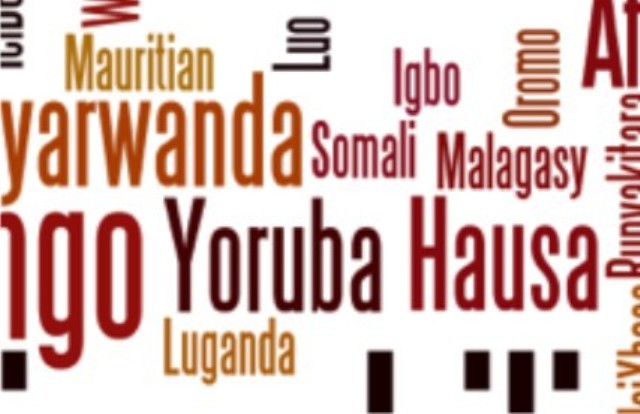Opinion
Before Our Local Languages Go Extinct…

Language has been the primary element that supports
culture as the identity of a people. It is obvious that without language, there is no culture and without culture, there is no identity.
The preservation of language is a collective responsibility of its owners and it requires constant usage, else it is prone to death and then extinction.
In an attempt to preserve languages in Nigeria, the Federal Government enacted the 1977 Declaration of National Policy on Education (NPE) that gives primary and secondary school children an opportunity to study two languages; one of which is their mother’s tongue or the indigenous language of wider communication. The other is the English Language.
The declaration also gives secondary school students, the opportunity to study three languages one of which is the mother’s tongue or an indigenous language that is generally accepted in the area. The others are English language and any among the country’s three major languages (Hausa, Igbo and Yoruba).
It is quite unfortunate, however, that in our country today same government schools prohibit the speaking of indigenous or local languages. This dissuades students from learning it.
Instead of encouraging indigenous languages in schools, teachers see it as an act of indiscipline for a student to speak in his local language which is branded vernacular. In some schools, “vernacular is prohibited” is conspicuously written in classes. Sanctions are even meted out to violators of this rule.
Our preference for a foreign language (English Language) which was one of the instruments of colonialisation shows we are still entangled in the nets of our colonial masters. In a country of over 170 million peoples, how many languages are being taught in our schools apart from Yoruba, Hausa and Igbo language? Your guess is as good as mine.
I am not against English language as a mode of communication but prominence given to it over our own languages is embarrassing and devastating to our culture such that today only an insignificant percentage of children can speak their mother’s tongue.
A student who fails English Language but passes his indigenous language in an examination is considered a failure and asked to resit, but one who fails his indigenous language but passes English Language is celebrated as success. This is inferiority complex of the highest order, or what the late Afro-music icon, Fela Anikulapo kuti called ‘colo mentality’.
It is even shocking that some parents and guardians send their children and wards to private schools just because of the unfounded fear that those children in the public schools would not be able to speak good English Language. Some parents consider it embarrassing to communicate with their children in local languages at home, unknown to them that indigenous language is an identity that adds beauty to culture.
The effect of relegating our indigenous languages to the background can be seen in the insignificant number of secondary school leavers who apply to study indigenous languages in our universities. Virtually all the private schools in the country do not have local languages in their syllabus.
My fear, therefore, is that unless government compels schools to include local languages in their syllabus, the country may be left with future generation who will be unable to speak their local languages. If that happens, our indigenous languages will be as good as been dead.
It is, therefore, incumbent on the government, particularly the Federal Ministry of Education to re-enforce the 1977 Declaration of National Policy on Education.
Parents, guardians and teachers are also expected to encourage the usage of indigenous languages as an acceptable medium of communication among children, either at home or in the school.
Meanwhile, competitions that will attract awards and scholarships on indigenous languages should be encouraged by the government and private sector.
It will be disastrous if generations to come do not meet their mother tongues just because of our blind preference for foreign language.
Perharps, I should remind us that the likes of our only Nobel Laureate, Professor Wole Soyinka and late literary giant, Chinua Achebe excelled in their literary works because of their versatility and deep understanding of their local languages which they translated into English Language to win awards. If these two literary icons could go far in life through the use of their mother tongue, why can’t we follow their footsteps?
Akpan is of the Federal University, Otuoke
Linus Akpan
Opinion
Empowering Youth Through Agriculture

Opinion
Of Protests And Need For Dialogue

Opinion
Tackling Noise Pollution in Nigeria

-

 Politics5 days ago
Politics5 days agoPFN Rejects Call For INEC Chairman’s Removal Over Genocide Comments
-

 Rivers5 days ago
Rivers5 days agoFasthire, PHCCIMA, CIPM Host CareerFest 2026 In PH
-

 Sports5 days ago
Sports5 days agoEnekwechi wins Orlen Cup in season opener
-

 Politics5 days ago
Politics5 days agoHoodlums Disrupt LP-ADC Defection Event In Lagos
-

 Sports5 days ago
Sports5 days agoFalconets, Senegalese Lionesses arrive Ibadan for qualifier
-

 Sports5 days ago
Sports5 days agoSimba open Nwabali talks
-

 Politics5 days ago
Politics5 days agoRemoval From INEC’s Portal, Abure-Led LP Faction Mulls Legal Action
-

 Niger Delta5 days ago
Niger Delta5 days agoTinubu, Jonathan, Diri Pay Last Respect To Ewhrudjakpo

